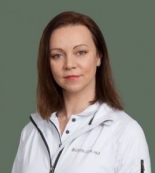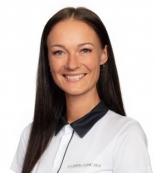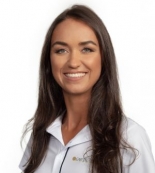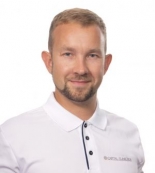
Ilona Dorofejeva
Certified physiotherapist, certified specialist in cranial, structural, visceral biomechanical osteopathy techniques
- from 2018 - studies at the University of Latvia Postgraduate School of Osteopathy
- Graduated the Faculty of Rehabilitation at the Medical Academy of Latvia.
- Member of the Latvian Association of Physiotherapists.
- Member of the ICAK Baltikum.
Further education:
- Latvian Association of Manual Medicine (foundations of manual therapy, visceromanual therapy, manual therapy, treatment of scoliosis, manual therapy for rehabilitation of pelvic and spinal functional disorders). (2004-2008)
- Latvian Association of Physical Medicine (Laser medicine)
- ICAK (International College of Applied Kinesiology)
- AK Introduction (2008)
- AK Manual Therapy, Part 1 (2008)
- AK Manual Therapy, Part 2 (2014)
- AK Meridian Therapy (2008)
- AK and Cranial Osteopathy, Part 1 (2009)
- AK and Cranial Osteopathy, Part 2 (2009)
- Sphenobasilar Synchondrosis: Assessment, Correction with Palpation and Applied Kinesiology (2013)
- LLC Centre of Medicine and Education VOKS
- Craniosacral Therapy (2013)
- Genetical Behavior or Character on the Face (2009)
- Psychokinesiology. Tools for Working (2012)
- Upledger Institute International
- Craniosacral Therapy 1 (2015)
- Craniosacral Therapy 2 (2015)
- Somato-Emotional Release 1 (2016)
- Somato-Emotional Release 2 (2016)
Gives consultations, carries out functional diagnostics using the osteopathy method. Offers osteopathy, manual therapy, sling therapy, remedial exercise, kinesiologic taping, laser therapy, uses the functional desk MANUTHERA 242 in practical work.
An osteopath evaluates the patient’s functional state, examines the patient's posture and gait, evaluates the symmetry of the body and movement stereotypes. An osteopath knows anatomy, biomechanics, and is well versed in physiology and neurology. When examining a patient, an osteopath uses static and dynamic tests for assessment, and various neurological and orthopaedic tests. During training and over the years of practice, an osteopath develops excellent palpation skills and the ability to feel the state of body tissues, movements of the body structures.
During the consultation, an osteopath assesses the state of the musculoskeletal system (state of bones, joints, ligaments, muscles, fasciae, periosteum, synovial bursae, muscle tendons). Assesses the mobility (sliding) and motility (movement in the organ) of the internal organs, functional mobility of the nervous system, lymphatic system, cardiovascular and respiratory systems. An osteopath tests the mobility of the craniosacral system, examines the elasticity of the cranial sutures and micromovements in them by palpation, can identify the level of limited micromobility, and establish the cause of this limitation. The patient’s psychoemotional state plays an important role in diagnosis and treatment. After the examination, the patient is given a functional diagnosis and the necessary corrections are carried out in compliance with the concept of treating the person as a whole.
Treats using osteopathy:
- Diseases related to movement disorders: postural disorders, non-specific back pain, joint pain, degenerative spine disease, spondylosis, spondyloarthrosis, radiculitis, myofascial pain, muscle imbalance, etc.
- Neurological disorders: headache, migraine (consultation of a neurologist is recommended), sleep disorders, neurovegetative dystonia, child behavioural disorders (hysterics, hyperactivity, attention disorders). Psycho-emotional overload, burnout syndrome, muscle tics, difficulty focusing, memory impairment, anxiety, restlessness.
- After dental and orthodontic procedures, changes in dental occlusion, surgeries, tooth extraction, pain and dysfunction of the temporomandibular (jaw) joint.
- After conservative and surgical treatment of injuries.
- Sports injuries and exertion.
- Otorhinolaryngology: degree 1 and 2 adenoids, chronic sinusitis, rhinitis, pharyngitis (without pus).
- Gynaecology: adhesions, painful menstruation, changes in the uterine position, hypertone or imbalance in the muscles of the pelvic diaphragm.
- Gastroenterological functional disorders.

Santa Matroze
Certified physiotherapist
- 2009 – 2013 Latvian Academy of Sport Education, professional bachelor's degree in sports science and qualification of physiotherapist, specialist in education and sports work
- 2018 – physiotherapist’s certificate
- Member of the Latvian Association of Physiotherapists.
Professional experience:
- 2019 – physiotherapist in Latvian basketball select team U18 (the Latvian Basketball Association)
- 2017/2018, 2018/2019, 2019/2020 – physiotherapist in the basketball club Ventspils
- 2016– 2017 – physiotherapist in SIA Raivja Aršauska veselības centrs
- 2015 – physiotherapist in preschool educational institution PII Kastanītis
- 2014– 2015 – physiotherapist in SIA Sanare-KRC Jaunķemeri
- 2013/2014, 2014/2015, 2015/2016 – physiotherapist in the Basketball club Jūrmala/Fēnikss
Continued education:
- 2020 – Maitland Manual therapy (level 1)
- 2016 - certificate in sling therapy Redcord Neurac1
- 2014 – Participation in Erasmus intensive PFA courses (Erasmus Intensive Programme, Institute of Technology, Tralee)
- 2012 – Certificate in BASIC medical taping
Participates in seminars organised by the Latvian Physiotherapists’ Association, obtains additional knowledge at conferences and courses.
Specialises in treatment of back pain, soft tissue mobilisation methods, massage using the method of manual therapy.
The physiotherapist can be consulted in case of off-the-job, sports injuries, back pain, shoulder tension, headache, dizziness.
The physiotherapist makes an individual exercise plan, conducts remedial exercise, does massage, medical taping, joint movement work out using manual therapy methods.
Gives consultations to patients over the age of 7 years. Gives consultations in Latvian and English.

Lizete Pitena
Certified physiotherapist
- 2020 Riga Stradiņš University, Faculty of Rehabilitation, bachelor’s degree in physiotherapy
- 2019 – Erasmus exchange programme physiotherapy practical training in Spain, Valencia
- 2010 – University of Latvia, Faculty of History and Philosophy, bachelor’s degree in philosophy
Member of the Latvian Association of Aesthetic Gynaecology, Latvian Physiotherapists’ Pelvic Health Association and Latvian Physiotherapists’ Association.
Professional experience:
2019 – Riga East Clinical University Hospital Gaiļezers, Department of Urology, assistance during urodynamic investigations
Continued education:
- 2020. - “Herman & Wallace” (USA) - Sexual Medicine in Pelvic Rehab
- 2020 – Herman & Wallace (USA) – Pelvic floor level 1
- 2017 – Medical taping concept for physiotherapists
Participates in seminars organised by the Latvian Physiotherapists’s Association, the Latvian Physiotherapists’ Pelvic Health Association and the Latvian Association of Aesthetic Gynaecology, gets additional knowledge at conferences and courses on a regular basis.
Specialises in pelvic rehabilitation (diagnosis of the pelvic floor muscles (PFM), treatment of health issues associated with PFM dysfunction).
We recommend to consult the specialist to patients with interstitial cystitis, urinary incontinence, prolapse of internal organs, endometriosis, chronic pelvic pain syndrome, diastasis, pain in the lower back, sexual dysfunction associated with PFM dysfunction, and patients requiring postpartum rehabilitation.
The physical therapist makes an individual exercise plan, conducts remedial exercise and does medical taping.
Gives consultations to patients aged 12 years and upward. Gives consultations in Latvian and English

